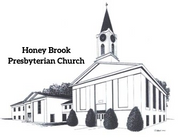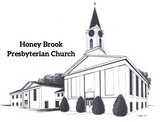About us
Welcome to Honey Brook!
Honey Brook Presbyterian Church is a safe place to ask the large questions of life. These are the ones that have no pat or easy answers. Because they are God-size, they deserve attention in a welcoming faith community. Your questions are welcome here.
We are here to rejoice with those who rejoice and grieve with those who grieve. In all seasons of life, we aim to equip, empower, and encourage persons to live their lives with faith, hope, and love. Your life-story, your moments of wonder and wounds, are welcome here.
A congregation of the Presbyterian Church (U.S.A.), Honey Brook is a small but mighty congregation motivated by a passionate love for God and neighbor, as Jesus instructs us to be. The church building is ADA accessible. All persons, including you, are welcome here.
Vibrant Worship Relevant for Life Today
Traditional in format, vibrant and relevant in content, open to God’s children of all ages, worship at Honey Brook focuses on:
- God’s Word speaking through the Bible
- Thought-provoking and prophetic preaching
- The songs that nurture our spiritual lives.
The weekly worship experience is deepened through service within the community and the world, small group study, and fellowship gatherings.
We welcome you to become part of Honey Brook’ Presbyterian Church’s ministry and mission to serve God’s world. We seek to extend Jesus’ hospitality beyond our walls and to all persons in the region.
Frequently Asked Questions
What does the church offer for young children?
Children make loud, joyful noises in praise of God, and following the example of Jesus, we welcome children of all ages to our worship services. At 10:30 am intergenerational worship you are welcome to sit with your children on the main floor of the sanctuary or in the balcony (if you don’t feel comfortable on the main level). We are a congregation of moms, dads, grandmas, granddads, uncles, aunts, sisters and brothers, and most friends in Christ.
What does the church offer for older children of God?
- At 9 a.m., a light breakfast is served in our Fellowship Hall, followed by an intergenerational time of Bible Study and conversation that allows us to split up as we wish: by family, by age, by desire to meet new people each week . . . however we prefer.
- Following worship most Sundays, we also return to Fellowship Hall following 10:30 a.m. worship for informal gathering and conversation.
- We also have a monthly Shepherd’s Kitchen, to which we invite the entire Honey Brook area for the sake of food and fellowship. We believe God wants the church to provide a place where persons, normally separated from each other by life circumstances, can meet at table and enjoy camaraderie with one another.
- Presbyterian Women often lead us in our mission endeavors.
- We participate in community festivals and have our own celebrations.
What do I have to offer the church?
The briefest answer is that you bring your commitments to Jesus Christ and this congregation. Based on these commitments, we believe that God is working through you to have an impact that we can only imagine.
A second answer leads to a path you might not have discerned yet: For what Christian mission or ministry might you be looking, and what would you be willing to create and lead i.e., as you are empowered by God’s Spirit with the support of this congregation? We can help you discern God’s call to you and God’s calling for you.
What must I believe and do to become a Presbyterian?
There is no authoritative list of beliefs to which members of the Presbyterian Church (U.S.A.) must subscribe. Our fundamental conviction is that Jesus is the Lord and Savior of all creation, including you and me. To join a Presbyterian Church (USA) congregation requires only
- A public confession of Jesus Christ as Lord and Savior, thereby announcing our commitment to him; as well as
- A public promise to serve Christ in, with, and through a local congregation of believers.
This confession of openness to Christ’s leadership and the church’s fellowship means that sometimes we Presbyterians resist easy categorization! We come in all sorts of shapes, sizes, colors, politics, and much else. Nevertheless, we share a common understanding that our submission to Jesus Christ and his love makes all such distinctions less important than those outside the church might believe.
What follows gives you an idea of who Presbyterians are and what makes us unique. Want to talk about it? Please contact Pastor Sam at 319-400-9824 or samuel.massey1226@gmail.com.
We are the Presbyterians!
Identity
We can summarize the mindset of the Presbyterians in two paragraphs.
First, Presbyterians believe that both the church and the world outside are like a kitchen junk drawer. This drawer holds important items, yet periodically it needs to be dumped out and sorted, with the important items returned to the drawer while the unimportant ones get tossed (shared below, in the section labeled “Presbyterian Principles,” are what we believe are “the keepers”). We do this dumping, keeping, and tossing based upon our efforts to discern what Jesus Christ tells us, with the Bible as our primary (but not sole) source and in conversation together. What we deem important is
- who God, our Loving, Speaking, Creating Parent is
- who Jesus is
- who the Spirit is
- God’s vision for both the church and the world.
Everyone thing else is far less important! Because of our willingness to dump out the drawer and reexamine everything in the church and the world, we say that we are reformed, and reforming, according to the Word of God. This belief system is called Reformed theology.
Second, Presbyterians believe that to understand God’s purposes for us, church, and world, we need other people. They help us interpret our Bibles and reflect carefully on what God might be saying, both through the Bible, in worship and study, in creation, and in our everyday lives. This insistence - that wherever two or three are gathered is the place where Jesus is most clearly seen and heard -leads to a form of church government that stresses the active, representative leadership of both pastors and elders, praying, studying, and dialoguing together. Pastors and ruling elders are elected by increasingly expansive representative gatherings of faithful people (congregations, presbyteries, synods, and the national General Assembly). Once elected, they are trusted for a set term of years to take up roles and make decisions on behalf of those who elected them. Presbyterians are fond of claiming that the democratic form of government of the United States of America, when functioning at its best, is founded on the Presbyterian model borrowed by our constitutional forebears, James Madison being both one of three architects of the United States Constitution and a Presbyterian. Presbyterians believe that their form of government honors the Lordship of Christ exercised through people gathered, with different opinions and gifts. It also honors traditions without being bound by them: Presbyterians leave room for God “to do a new thing” and then invite us, God’s people, to recognize and respond to it. To paraphrase Winston Churchill when speaking of democracy, Presbyterian governance is the worst way to govern a church, except for all the others.
History
The Presbyterian Church (USA) has deep roots in biblical faith. The courage of Abraham and Sarah, called by a God to leave behind safety and security and travel to an unknown land, is our definition of the essential faithful life. The prophets echoed it, Jesus lived it, the Spirit leads it, the likes of St. Paul and St. Augustine taught it, and periodically the church must reform itself and speak prophetically to the world to reaffirm it. The Presbyterian Church (USA) is one more witness to God’s power and persistence through Jesus Christ. It points beyond itself to God’s effort to reclaim creation for the sake of love, mercy, and justice. This outcome is the kingdom or realm of God that Jesus taught and with eyes of faith we see it continuing to emerge in, around, and through us.
As a reiteration of God’s ancient initiative, Reformed theology and the Presbyterian form of government emerged in the 16th Century, during the rise of Protestantism. The person we recall having the most influence on us was John Calvin, a French attorney and city manager of Geneva. Calvin wrote extensively, and what is now termed Calvinism thrived in the British Isles and from there, launched into the rest of the world.
Presbyterian Principles
Some basic principles of Presbyterian and Reformed theology are:
- The Sovereignty of God
God is the sovereign authority throughout the universe, our Creator, and the ground of being.
- The Centrality of Jesus Christ
Presbyterians share with all Christians the belief that Jesus Christ is central to our lives, our worship, and our service. We believe Jesus Christ is God Incarnate: 100% human and 100% divine, a mystery. We believe that God in Christ came to live among us and die for us, that he is risen from the dead and universally present, so that all might come to know the grace of God and the gift of salvation through faith in Him.
- The Authority of Scripture
The Bible is, by the inspiration of the Holy Spirit, the Word of God. Presbyterians are not literalists or fundamentalists, but do understand the Bible to be the authoritative source of faith and practice for all of life. It is not simply the words on the page that are authoritative, but the moment when the Spirit of God that speaks through these words and they interact with the human heart that make them the Word.
- Justification by Grace through Faith
Our salvation (justification) through Jesus Christ is God’s generous gift (grace) to us and not the result of our own accomplishments. “For by grace you have been saved through faith, and this is not your own doing; it is the gift of God, not the result of works, so that no one may boast (Ephesians 2:8-9).”
- The Priesthood of All Believers
Presbyterians believe it is everyone’s responsibility (not just pastors) to share the Good News of God’s grace in Jesus Christ and to provide care to the world.
- We are Saved to Serve
Presbyterians believe the purpose of salvation is to serve God by serving others. Salvation is not understood as a thing, or a commodity, or as “insurance” of some sort, but as God’s gracious choice and calling to us for the purpose of service. Christian service includes, but is not limited to, the following: worship, sharing the good news (evangelism), mission, Christian education, love of neighbor and enemy, prayer, and social and civic awareness and activity.
- The Great Ends of the Church
Presbyterians believe that the Church has six charges given to it by God:
- the proclamation of the Gospel for the salvation of humankind
- the shelter, nurture, and spiritual fellowship of the children of God
- the maintenance of divine worship
- the preservation of truth
- the promotion of social righteousness
- the exhibition of the Kingdom of Heaven to the world
These are God-size mandates for people like us who are God’s children and created in God’s image. Do these charges sound important to you too?
Would you like to learn more about loving and serving the Risen Christ in Presbyterian community?
How might we encourage, equip, and empower you to find the way, hear the truth, and enjoy the life that the Risen Christ shares?
Consider the Honey Brook Presbyterian Church as a hospitable stop on your lifelong journey, inviting you to share in service, worship, and fellowship in this faithful community for as briefly or as long as you like.
Do you have questions for us?
Please feel welcome to contact
610-273-2848 or hbpresby1@gmail.com
We look forward to welcoming you!


